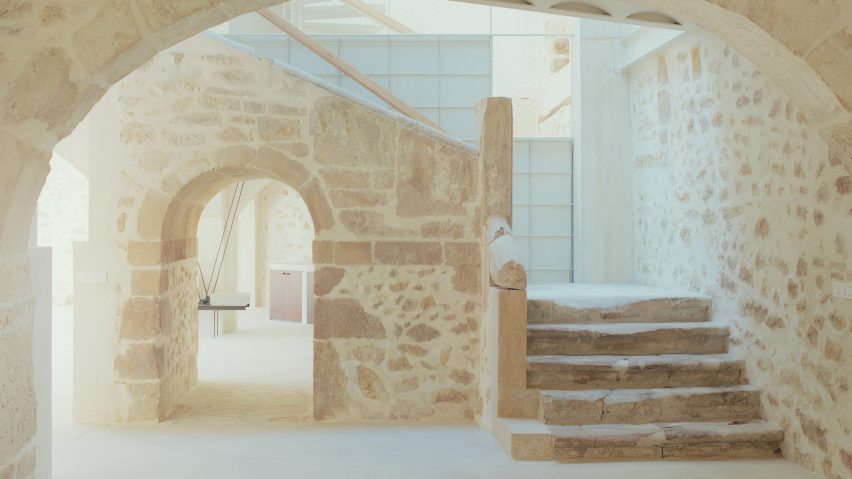In this lookbook, we feature nine residential projects that demonstrate unique ways of interacting with a site's history by weaving existing ruins into their designs.
Until recently, it has been common practice to hide away old structures during adaptive reuse projects.
However, the architects in this list embrace the past by stitching domestic spaces with the remains of former buildings, creating inventive encounters with preserved architectural remains.
This is the latest in our lookbooks series, which provides visual inspiration from Dezeen's archive. For more inspiration see previous lookbooks featuring clever outbuilding interiors, homes with mid-century modern furniture and residential spaces with playful net floors.
Nickzy Apartment, Hungary, by Béres Architects
Carefully preserved stone walls are featured in this Hungarian guesthouse renovation by local studio Béres Architects.
20th-century plaster finishes have been stripped back to expose the 400-year-old apartment's original stonework, reestablishing its visual prominence against modern white-rendered walls.
Find out more about Nickzy Apartment ›
El Priorato, Spain, by Atienza Maure Arquitectos
The interiors of this 16th-century Spanish clergy house were restored by Atienza Maure Arquitectos to create ambiguity between the existing structure and new interventions.
Concrete vaults, white-painted walls and limited fixtures sit alongside heritage-protected arches to create minimal differentiation between the materials and spaces.
Find out more about El Priorato ›
Mediona 13, Spain, by Nua Arquitectures
In the historic centre of Tarragona, Spain, Nua Arquitectures reinforced this home's crumbling stone and timber structure with brightly coloured steel supporting elements.
According to the studio, the steel insertions add another layer to the home's visible "memory" and draw attention to the historic building fabric.
Find out more about Mediona 13 ›
Croft Lodge Studio, West Midlands, by David Connor Design and Kate Darby Architects
David Connor Design and Kate Darby Architects enclosed the decaying remains of a 300-year-old building under a steel-framed shell in England's West Midlands area.
The bold new studio maintains every aspect of the heritage-listed structure within the internal living spaces, including the rotting timber, dead ivy and old birds' nests.
Find out more about The Parchment Works ›
Cascina, Italy, by Jonathan Tuckey Design
For this farmstead restoration in Italy, British studio Jonathan Tuckey Design prioritised returning the 19th-century buildings to their original state with minimal alterations.
The existing beams and trusses of the distinctive barn roof had lost their structural integrity, leading the studio to layer a new roof atop the timber without disrupting the internal aesthetic.
Ardoch House, Scotland, by Moxon Architects
Moxon Architects expressed eye-catching details of 19th-century ruins within this outbuilding refurbishment in the Scottish Highlands.
Alongside new finishes of uniform clay plaster, pieces of the crumbling masonry were preserved within the guesthouse's renovated walls and doorways as subtle connections to the earlier building.
Find out more about Ardoch House ›
The Parchment Works, Northamptonshire, by Will Gamble Architects
The remains of a 17th-century parchment paper factory and cattle shed were brought into focus within this residential extension by Will Gamble Architects.
New interventions were intended to be discreet, exposing original structural elements internally, while configuring glazing to look out onto uncovered ruins from the ground floor.
Find out more about The Parchment Works ›
This 200-year-old English barn was in a state of disrepair before TYPE restored it into a modern family home.
Aiming to distinguish between old and new, the studio lined contemporary wall finishes and wood panelling against remnant stone walls, while using existing columns to dictate the house's layout.
Find out more about Redhill Barn ›
Cuddymoss, Scotland, by Ann Nisbet Studio
Scottish architecture practice Ann Nisbet Studio inserted a timber-framed home into a stone ruin in Scotland and defined new living spaces within the surviving forms.
To encourage layered encounters of the site, views of the landscape were also aligned with existing window apertures from the bedrooms.
Find out more about Cuddymoss ›
This is the latest in our lookbooks series, which provides visual inspiration from Dezeen's archive. For more inspiration see previous lookbooks featuring homes with net floors, mid-century modern furniture and perforated brick walls.

